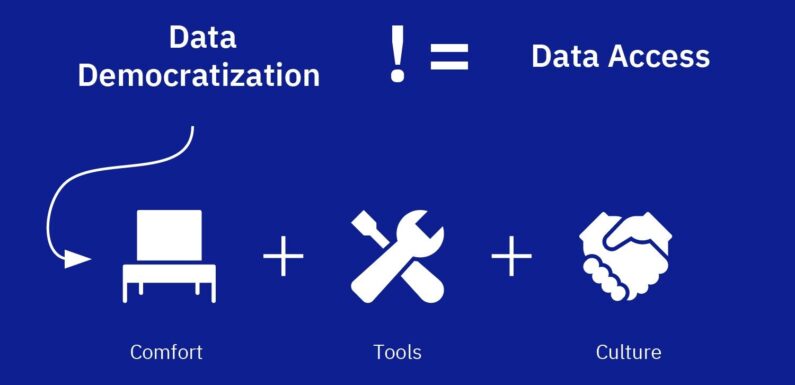
Introduction
In today’s data-driven world, the ability to access, understand, and utilise data is becoming increasingly essential for all professionals, not just data analysts. Data democratisation aims to break down barriers, making data accessible to everyone within an organisation, regardless of their technical background. Encouraging their workforce to learn data democratisation by attending a data analyst course in pune can help companies bridge the gap between technical experts and their counterparts who might not be as highly technically-oriented. By doing so, companies can empower their workforce, foster innovation, and drive more informed decision-making.
What is Data Democratisation?
Data democratisation refers to the process of making data accessible to non-technical users across an organisation. It involves creating systems, tools, and processes that allow employees, regardless of their expertise in data science or analytics, to access and interpret data. The goal is to eliminate gatekeepers and enable every employee to use data in their day-to-day work.
The Importance of Data Democratisation
In the past, data was often confined to specific departments or roles, typically within IT or specialised analytics teams. However, as businesses increasingly rely on data to inform decisions, it has become clear that limiting access to data is a missed opportunity. By democratising data, organisations can:
- Enhance Decision-Making: When more people have access to data, decisions can be made more quickly and based on real-time insights.
- Foster Innovation: Employees who have access to data can identify new opportunities and develop innovative solutions to problems.
- Increase Efficiency: By empowering employees with the data they need, organisations can reduce bottlenecks and improve overall efficiency.
- Build a Data-Driven Culture: Data democratisation helps to embed a data-driven mindset across the organisation, leading to more consistent and objective decision-making.
In view of such critical benefits, business organisations are increasingly encouraging their workforce, both technical and non-technical to attend a data analyst course so that closer collaboration is possible.
Key Components of Data Democratisation
To successfully implement data democratisation, organisations need to focus on several key components:
- User-Friendly Tools: Providing non-technical employees with easy-to-use tools for data access and analysis is crucial. Tools with intuitive interfaces, like dashboards and self-service analytics platforms, enable users to explore data without needing extensive training.
- Data Literacy Training: While user-friendly tools are essential, they need to be accompanied by efforts to improve data literacy across the organisation. This means educating employees on how to interpret data, understand basic analytics concepts, and apply data to their roles.
- Data Governance: Ensuring that data remains accurate, secure, and compliant with regulations is vital. Data governance frameworks should be in place to manage data access and usage while maintaining data integrity and privacy.
- Collaboration and Communication: Encouraging collaboration between data experts and non-experts helps to bridge the knowledge gap. Creating cross-functional teams and promoting open communication can foster a culture where data-driven insights are shared and valued. In large organisations, data analysts and such technical persons need to convey their findings to their counterparts who might not be as tech-savvy as themselves. Thus, completing a data analyst course in Pune and such cities is helpful to both data analysts and non-technical personnel such as leadership personnel in working collaboratively.
- Scalable Infrastructure: As more employees access and use data, the organisation’s data infrastructure must be scalable to handle the increased demand. Cloud-based solutions, data lakes, and advanced storage options can support the growing needs of a data-democratised environment.
Challenges of Data Democratisation
While the benefits of data democratisation are clear, organisations may face several challenges. Inclusive technical learning must expose learners to the challenges a technology faces and also include lessons in workarounds. A data analyst course in Pune, for instance will expose learners to the challenges involved in data democratisation as well as equip them to circumvent those challenges in real-world scenarios that they will encounter as professionals in their careers ahead.
- Data Overload: With more people accessing data, there is a risk of information overload. Employees may struggle to identify the most relevant data, leading to analysis paralysis.
- Security Risks: Expanding data access can increase the risk of data breaches or misuse. It’s important to implement robust security measures and establish clear guidelines on data usage.
- Resistance to Change: Some employees may resist adopting new tools or approaches, particularly if they are accustomed to relying on expert analysts. Overcoming this resistance requires strong leadership and a commitment to building a data-driven culture.
The Future of Data Democratisation
As technology continues to evolve, the potential for data democratisation will only grow. Advances in artificial intelligence (AI) and machine learning (ML) will further simplify data analysis, making it even more accessible to non-technical users. Additionally, as data literacy becomes a standard skill in the workforce, organisations will increasingly see the benefits of a democratised data environment.
Conclusion
Data democratisation is more than just a trend; it is a transformative approach that can empower every employee to make better, data-informed decisions. By investing in the right tools, training, infrastructure, and the right data analytics course for their workforce, organisations can unlock the full potential of their workforce, driving innovation, efficiency, and growth. As data becomes more accessible, the line between data analysts and other professionals will blur, leading to a more collaborative and dynamic business environment.
Business Name: ExcelR – Data Science, Data Analyst Course Training
Address: 1st Floor, East Court Phoenix Market City, F-02, Clover Park, Viman Nagar, Pune, Maharashtra 411014
Phone Number: 096997 53213
Email Id: enquiry@excelr.com

